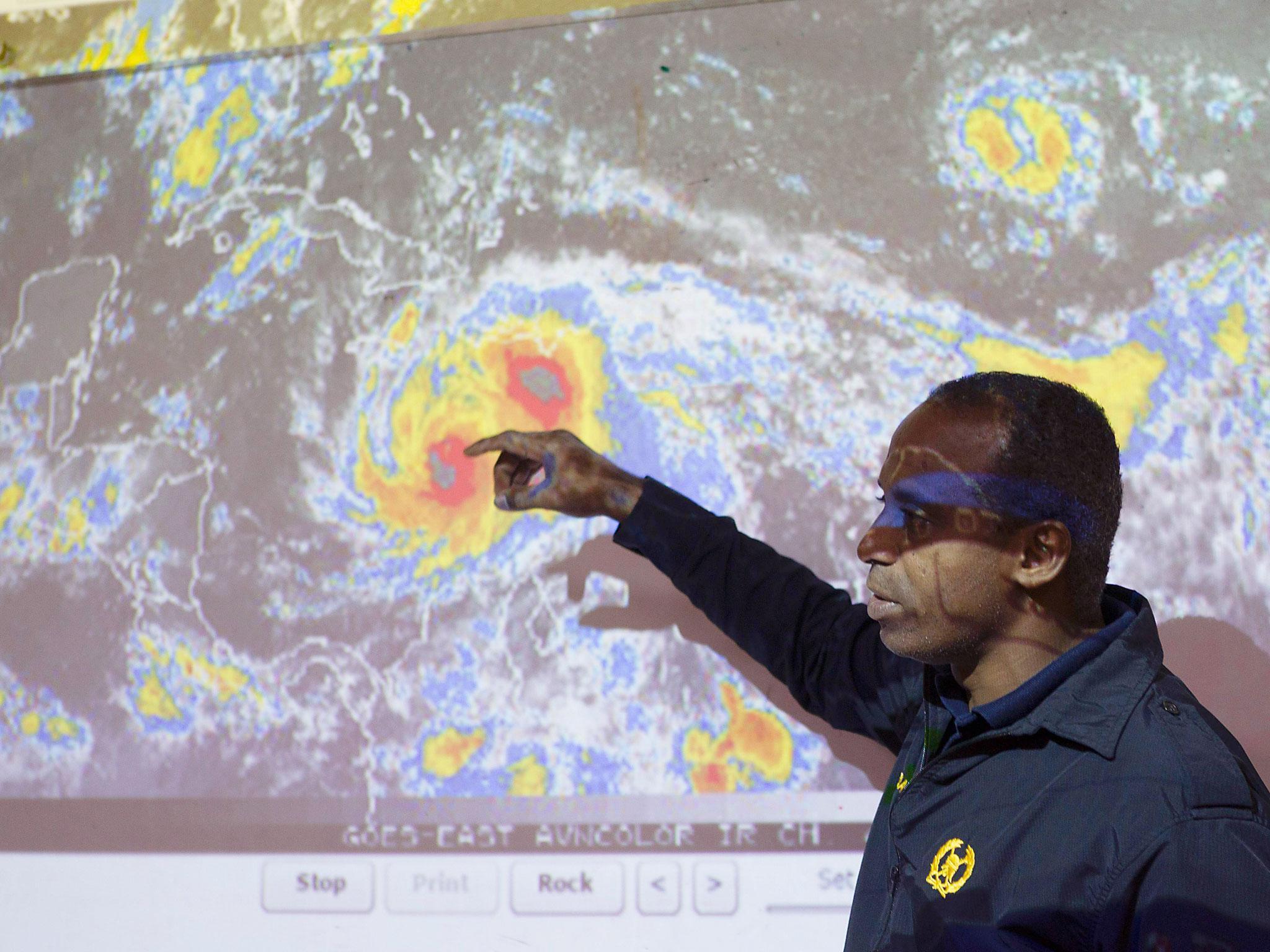Hurricane Matthew: Millions of people in Florida and Carolinas ordered to evacuate as storm creeps up East Coast
The most powerful and longest-lasting Atlantic storm since 2007 is battering Haiti and will head to Cuba and the Bahamas before edging up the eastern seaboard

Your support helps us to tell the story
From reproductive rights to climate change to Big Tech, The Independent is on the ground when the story is developing. Whether it's investigating the financials of Elon Musk's pro-Trump PAC or producing our latest documentary, 'The A Word', which shines a light on the American women fighting for reproductive rights, we know how important it is to parse out the facts from the messaging.
At such a critical moment in US history, we need reporters on the ground. Your donation allows us to keep sending journalists to speak to both sides of the story.
The Independent is trusted by Americans across the entire political spectrum. And unlike many other quality news outlets, we choose not to lock Americans out of our reporting and analysis with paywalls. We believe quality journalism should be available to everyone, paid for by those who can afford it.
Your support makes all the difference.A powerful hurricane with winds of up to 145mph is battering Haiti, the poorest country in the Western hemisphere where many residents are unprotected under shacks of corrugated iron.
Hurricane Matthew is being described as a possible humanitarian disaster, including 10 to 15 foot high waves, pounding rain and an onslaught of about one trillion gallons of water. The extreme weather could devastate a country with a population of more than 10 million, the majority of which live in poverty.
The National Hurricane Center predicts Matthew will move past Florida on Friday and make landfall on Saturday morning near the border of South and North Carolina, by which time it will likely weaken to a category two or three storm.
Millions of coastal residents have been warned to evacuate.
"During the middle of a storm, they [rescue workers] can't show up to save," Florida governor Rick Scott said. "Leave before it's too late."
President Barack Obama has cancelled a campaign stop for Hillary Clinton in Tampa, Florida, and is instead visiting the Federal Emergency Management Agency to track the storm and get an update on the federal emergency response.
Hurricane Matthew’s eye came ashore early on Tuesday morning in the western Tiburon Peninsula - the first time a category 4 hurricane made landfall in Haiti since storm Cleo in 1964. Before dawn, the storm had dumped rain that threatened to turn into flooding.
Hurricane Matthew has already made history as one of the most persistent and intense storms in the Caribbean Sea, first becoming a category four hurricane around 5pm EDT on 30 September. Seven deaths have already been reported.
Colorado State University tropical scientist Phil Klotzbach said the storm could end up as one of the longest-lasting Atlantic major hurricanes in the past 50 years of satellite records.
Between 15 and 25 inches of rain are expected, and as much as 40 inches in more isolated places.
Waves measuring 10 to 15 feet high are also anticipated in a storm surge, said Dennis Feltgen, a meteorologist and spokesman for the US National Hurricane Centre in Miami.
"They are getting everything a major hurricane can throw at them," he told the Associated Press.
The storm was moving along the Windward Passage between Haiti and Jamaica, where it was also dumping heavy rain that caused flooding in parts of the country. It was headed for southeastern Cuba and then into the Bahamas.
Mr Feltgen said it was too early to tell the likelihood and impact of Matthew hitting the East Coast later this week.
Haitian officials spent Monday trying to persuade shantytown residents to take advantage of shelters being set up. Some people took up the offers, but many refused, saying they feared their meager possessions might be stolen.
"If we lose our things we are not going to get them back," said Toussaint Laine, an unemployed man who lives with his family in a shack in Tabarre, a suburb of Port-au-Prince, the capital.
Authorities also went door to door in the south coast cities of Les Cayes and Jeremie to make sure people were aware of the storm's threats. At least 1,200 people were moved to shelters in churches and schools.
"We are continuing to mobilise teams in the south to move people away from dangerous areas," said Marie Alta Jean-Baptiste, head of Haiti's civil protection agency.
In an unregulated sprawl of shacks built near the northern edge of the capital, some poor families did what they could to reinforce their tin-and-tarp home and hoped for the best.
"I know my house could easily blow away. All I can do is pray and then pray some more," Ronlande Francois said by the tarp-walled shack where she lives with her unemployed husband and three children.
Cuba's government declared a hurricane alert for six eastern provinces and workers removed traffic lights from poles in the city of Santiago to keep them from falling when the storm hit.
The last such storm to hit was in 2007, when Felix reached category five status, with winds of 160mph and killed more than 130 people, mostly in Nicaragua.
Join our commenting forum
Join thought-provoking conversations, follow other Independent readers and see their replies
Comments